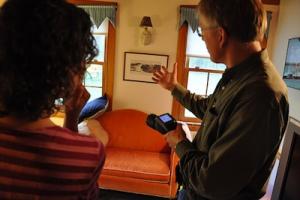
Winter's coming. It's already heating season. So how do you save money on heating costs? You've got to own your heat. Simple as that. You've paid for all that warm air already, so it doesn't make much sense to waste it now.
A simple enough premise - it's the application that gets complicated. We (and most building science experts) strongly recommend air sealing and insulation as high priority measures to make your home use less energy, make you more comfortable, and make the planet happy.
Air sealing can sometimes be done by a competent do-it-yourself-er, but insulation is trickier. It generally has to be done by a contractor, and for the most part can only be installed by getting inside walls that are now closed up. And unlike air sealing flaws, which you can often see just by scanning your basement walls, the quality of insulation in your house is, for the most part, difficult to assess. (Thankfully, the attic, which is the most critical spot for insulation, is the easiest to access).
This is an important point, because even if all insulation is created equal (a separate discussion), that doesn't necessarily mean that all insulation is equally well installed - which, in this case, may be just as important. Insulation only works when it's installed to specifications, and when it's in good shape. So even if there is insulation in your walls, even if you've seen it or paid for it or been told by your real estate agent that it's there, it may be sleeping on the job.
The best way to assess the quality of otherwise "invisible" insulation is a home energy audit from a qualified home energy auditor with an infrared scanner, which will reveal where there are problems with your insulation.
Another reason why a home energy audit is really a problem-solving exercise. After you have it done, you'll know where the issues are. Without it, your home might just remain an unsolved mystery... The Case of the Cold House and the Disappearing Dollars.
